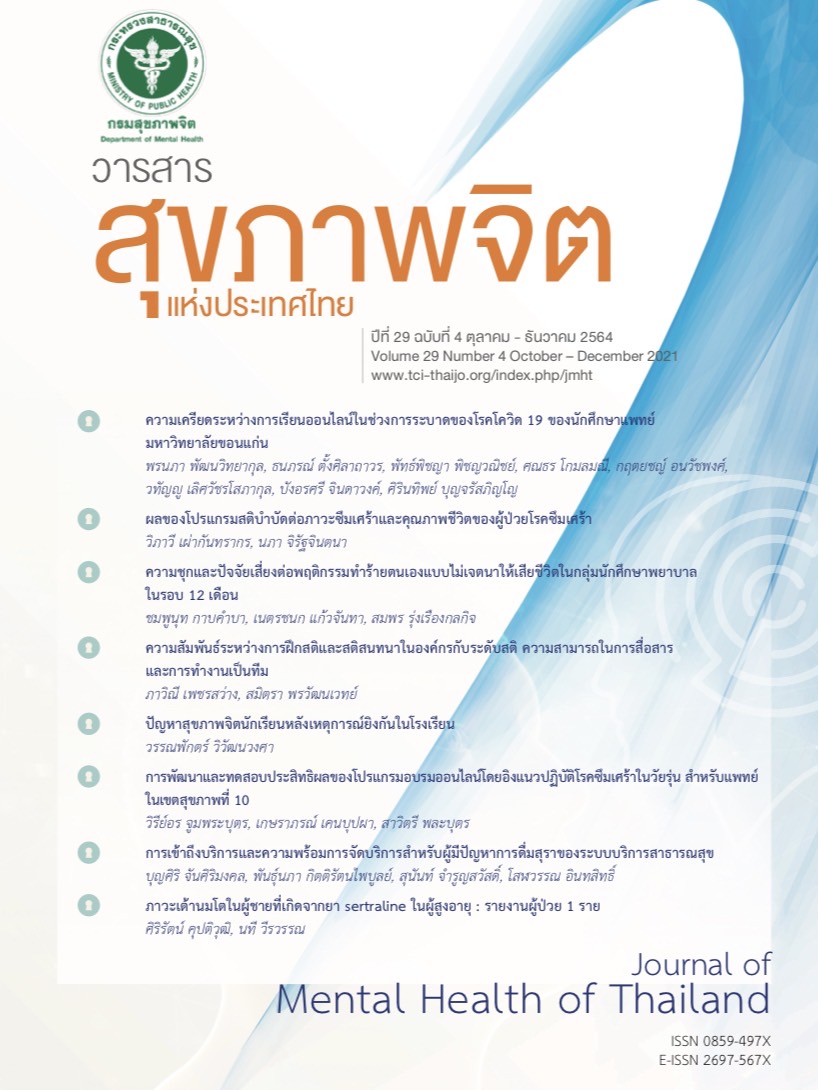ปัญหาสุขภาพจิตนักเรียนหลังเหตุการณ์ยิงกันในโรงเรียน
คำสำคัญ:
การยิงกันในโรงเรียน, ภาวะเครียดภายหลังเหตุการณ์สะเทือนขวัญ, ภาวะซึมเศร้าบทคัดย่อ
วัตถุประสงค์: เพื่อศึกษาความชุกและปัจจัยที่สัมพันธ์กับภาวะเครียดภายหลังเหตุการณ์สะเทือนขวัญ (PTSD) และภาวะซึมเศร้าของนักเรียนหลังเหตุการณ์ยิงกันในโรงเรียน
วิธีการ : นักเรียนมัธยมศึกษาปีที่ 1 ชั้นปีเดียวกับห้องที่เกิดเหตุการณ์ จำนวน 178 คน ประเมินตนเองหลังเกิดเหตุการณ์ 5 เดือนด้วยแบบสอบถามข้อมูลทั่วไป แบบประเมินผลกระทบจากเหตุการณ์ภัยพิบัติ (CRIES-13) และภาวะซึมเศร้าในวัยรุ่น (PHQ-A) วิเคราะห์ข้อมูลเชิงพรรณนา ได้แก่ ความถี่และร้อยละ และหาความสัมพันธ์โดยใช้ chi-square และ odds ratio
ผล : กลุ่มตัวอย่างมีอายุเฉลี่ย 13 ปี เพศชายและหญิงใกล้เคียงกัน (ร้อยละ 46.6 และ 54.4 ตามลำดับ) ร้อยละ 22.5 ของกลุ่มตัวอย่างเป็นนักเรียนในห้องที่เกิดเหตุการณ์ ร้อยละ 16.9 เห็นเหตุการณ์ยิงกัน ร้อยละ 64 ไม่เห็นเหตุการณ์แต่ได้ยินเสียงปืนและเสียงหวีดร้อง ร้อยละ 27.0 มีความเสี่ยง PTSD (CRIES-13 ≥ 25) ร้อยละ 10.1 มีความเสี่ยงภาวะซึมเศร้า (PHQ-A ≥ 10) และร้อยละ 6.2 มีความเสี่ยงทั้ง PTSD และภาวะซึมเศร้า เด็กที่มีความเสี่ยงภาวะซึมเศร้ามีความเสี่ยง PTSD มากกว่ากลุ่มที่ ไม่เสี่ยงซึมเศร้า 5.2 เท่า (95% CI = 1.9 - 14.4) ไม่พบตัวแปรส่วนบุคคลที่สัมพันธ์กับความเสี่ยง PTSD ส่วนตัวแปรที่มีผลต่อความเสี่ยงภาวะซึมเศร้า ได้แก่ การมีประสบการณ์ความรุนแรงในอดีต (OR = 4.7; 95% CI = 1.7 - 13.2) และความสนิทสนมกับผู้เสียชีวิต (OR = 2.9; 95% CI = 1.1 - 7.9)
สรุป : นักเรียนมีผลกระทบทางจิตใจ ความเสี่ยงของ PTSD และภาวะซึมเศร้าหลังการเผชิญเหตุการณ์ยิงกันในโรงเรียน ชี้ให้เห็นถึงความสำคัญของการคัดกรอง การปฐมพยาบาลจิตใจของเด็กที่ใกล้ชิดกับเหตุการณ์ รวมถึงระบบการติดตามในระยะยาว
Downloads
เอกสารอ้างอิง
Walker C. 10 years 180 school shootings 356 victims [internet]. Atlanta: Cable News Network; 2019 [cited 2019 Jan 12]. Available from: https://edition.cnn.com/interactive/2019/07/us/ten-years-of-school-shootings-trnd/#storystart
Livingston MD, Rossheim ME, Hall KS. A descriptive analysis of school and school shooter characteristics and the severity of school shootings in the United States, 1999-2018. J Adolesc Health. 2019;64:797-99. doi:10.1016/j.jadohealth.2018.12.006.
Brown JD, Goodin AJ. Mass casualty shooting venues, types of firearms, and age of perpetrators in the United States, 1982–2018. Am J Public Health. 2018;108(10):1385-7. doi:10.2105/AJPH.2018.304584.
Shultz JM, Cohen AM, Muschert GW, Flores de Apodaca R. Fatal school shootings and the epidemiological context of firearm mortality in the United States. Disaster Health. 2013;1(2):84-101. doi:10.4161/dish.26897.
Boffa JW, Norr AM, Raines AM, Albanese BJ, Short NA, Schmidt NB. Anxiety sensitivity prospectively predicts posttraumatic stress symptoms following a campus shooting. Behav Ther. 2016;47(3):367-76. doi:10.1016/j.beth.2016.02.006.
Lowe SR, Galea S. The mental health consequences of mass shootings. Trauma Violence Abuse. 2017;18(1):62-82. doi:10.1177/1524838015591572.
Travers A, McDonagh T, Elklit A. Youth responses to school shootings: a review. Curr Psychiatry Rep. 2018;20(6):47. doi:10.1007/s11920-018-0903-1. PMID: 29779059.
Curry V. Thurston High School. Journal of School Violence. 2003;2(3):93-120. doi:10.1300/J202v02n03_06.
กรมสุขภาพจิต กระทรวงสาธารณสุข. คู่มือการปฏิบัติงานทีมช่วยเหลือเยียวยาจิตใจผู้ประสบภาวะวิกฤต ฉบับปรับปรุง พ.ศ. 2561 [Mental health crisis assessment and treatment team: MCATT]. นนทบุรี: บียอนด์ พับลิชชิ่ง; 2561.
พนม เกตุมาน, วินัดดา ปิยะศิลป์. ความผิดปกติทางจิตใจภายหลังภยันตราย (PTSD) ในเด็กและวัยรุ่นที่ประสบภัยพิบัติทางธรรมชาติ : การเรียนรู้จากโครงการช่วยเหลือนักเรียนที่ประสบภัยสึนามิ 5 ปีในโรงเรียน อำเภอตะกั่วป่า จังหวัดพังงา [Posttraumatic stress disorder in children and adolescents : lesson learned from 5-year psychosocial intervention program for schools in Takuapa after Tsunami]. วารสารสมาคมจิตแพทย์แห่งประเทศไทย. 2552;54(ฉบับผนวก 1):81S-106S.
Weiss DS, Marmar CR. The impact of event scale—revised. In: Wilson JP, Keane TM, editor. Assessing psychological trauma and PTSD. New York: Guilford Press; 1991. p. 399–411.
วิมลวรรณ ปัญญาว่อง, โชษิตา ภาวสุทธิไพศิฐ, รัตนศักดิ์ สันติธาดากุล. รายงานการวิจัย เรื่องการพัฒนาแบบประเมินภาวะซึมเศร้าในวัยรุ่น [Development of the Thai version of the patient health questionnaire for adolescents (PHQ-A)]. กรุงเทพฯ: สถาบันสุขภาพจิตเด็กและวัยรุ่นราชนครินทร์ กรมสุขภาพจิต; 2561.
Johnson JG, Harris ES, Spitzer RL, Williams JBW. The patient health questionnaire for adolescents: validation of an instruments for the assessment of mental disorders among adolescent primary care patients. J Adolesc Health. 2002;30(3):196-204. doi:10.1016/s1054-139x(01)00333-0.
Cimolai V, Schmitz J, Sood AB. Effects of mass shootings on the mental health of children and adolescents. Curr. Psychiatry Rep. 2021;23(3):12. doi:10.1007/s11920-021-01222-2.
Norris FH. Impact of mass shootings on survivors, families, and communities. PTSD Research Quarterly. 2007;18(3):1-6.
Sarah R, Lowe G, Sandro G. The mental health consequences of mass shootings. Trauma Violence Abuse. 2017;18(1):62-82. doi:10.1177/1524838015591572.
World Population Review. School shootings by country 2021. Walnut CA; 2021 [cited 2021 Sep 20]. Available from: https://worldpopulationreview.com/country-rankings/school-shootings-by-country
Miron LR, Orcutt HK, Kumpula MJ. Differential predictors of transient stress versus posttraumatic stress disorder: evaluating risk following targeted mass violence. Behav Ther. 2014;45(6):791-805. doi:10.1016/j.beth.2014.07.005.
Nader K, Pynoos R, Fairbanks L, Frederick C. Children's PTSD reactions one year after a sniper attack at their school. Am J Psychiatry. 1990;147(11):1526-30. doi:10.1176/ajp.147.11.1526.
North CS, Smith EM, Spitznagel EL. Posttraumatic stress disorder in survivors of a mass shooting. Am J Psychiatry. 1994;151(1):82-8. doi:10.1176/ajp.151.1.82.
North CS, Smith EM, Spitznagel EL. One-year follow-up of survivors of a mass shooting. Am J Psychiatry. 1997;154(12):1696-702. doi:10.1176/ajp.154.12.1696.
Trappler B, Friedman S. Posttraumatic stress disorder in survivors of the Brooklyn Bridge shoot¬ing. Am J Psychiatry. 1996;153 (5):705-7. doi:10.1176/ajp.153.5.705.
Orcutt HK, Miron LR, Seligowski AV. Impact of mass shootings on individual adjustment. PTSD Research Quarterly. 2014;25(3):1-9.
Suomalainen L, Haravuori H, Berg N, Kiviruusu O, Marttunen M. A controlled follow-up study of adolescents exposed to a school shooting – psychological consequences after four months. Eur Psychiatry. 2011;26(8):490-7. doi:10.1016/j.eurpsy.2010.07.007.
ดาวน์โหลด
เผยแพร่แล้ว
รูปแบบการอ้างอิง
ฉบับ
ประเภทบทความ
สัญญาอนุญาต
- ผู้อ่านสามารถนำข้อความ ข้อมูล จากวารสารไปใช้ไปใช้ประโยชน์ทางวิชาการได้ เช่น เพื่อการสอน เพื่อการอ้างอิง แต่การนำไปใช้เพื่อวัตถุประสงค์อื่น เช่น เพื่อการค้า จะต้องได้รับอนุญาตเป็นลายลักษณ์อักษรจากกรมสุขภาพจิตก่อน
- ความคิดเห็น ข้อมูล และบทสรุปต่าง ๆ ที่ลงตีพิมพ์ในวารสารสุขภาพจิตแห่งประเทศไทยเป็นของผู้เขียนบทความและมิได้แสดงว่ากองบรรณาธิการหรือกรมสุขภาพจิตเห็นพ้องด้วย




